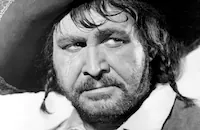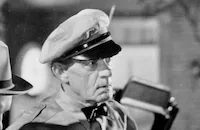Tillie and Gus
Brief Synopsis
Cast & Crew
Francis Martin
W. C. Fields
Alison Skipworth
Baby Leroy
Jacqueline Wells
Clifford Jones
Film Details
Technical Specs

Synopsis
When Mary Sheridan's father dies, lawyer Phineas Pratt informs her that her father left nothing but debt. Pratt purchases the Sheridan house and land in Danville, forcing Mary, her husband Tom and their baby King to move out. Tom invests his college savings in the only possession he has left, the Fairy Queen , a decrepit ferry he hopes to restore to working condition. Phineas, meanwhile, sends letters to Mary's divorced aunt and uncle, Augustus and Matilda "Tillie" Winterbottom, about the death of Tillie's brother. The message reaches Gus in Lone Gulch, Alaska, where he is being tried for shooting a man. Gus's sentence is to be shot at for one and a half hours, and after he learns of his fate, he packs to leave. Tillie receives her message in Shanghai, China, where she owns a saloon, which she loses to a Swede in a dice game. The divorced couple meet at the train station in Seattle, and proceed to con their way through a poker game as they head for Danville. Once there, they are informed by Phineas that Tillie's brother died bankrupt. Gus and Tillie plan to sell the ferry to Phineas and split the profits, but once on board the ferry, they meet Mary and Tom, who believe they are missionaries just returned from Africa. Although King takes an instant dislike to Gus, Gus and Tillie help the couple fix up the ferry. They are challenged by Phineas, however, who has convinced Commissioner McLennan of the state inspection board to withdraw their ferry franchise because he has purchased a new ferry, The Keystone , and does not want competition from them. Out of fairness, a ferry race is set for the Fourth of July, and whoever wins also gets the franchise. On the morning of the race, Gus goes underwater in a diving suit and ties The Keystone to the dock. Thus, The Keystone gets off to a late start in the race, but when it begins to catch up, Tom calls for more firewood for the engine fire. When the wood falls off the deck into the water, Gus improvises, and unintentionally gives Tom fireworks with which to stoke the fire. In the meantime, King has fallen overboard in a bucket in which Gus had placed him for safekeeping, and when Tillie lowers Gus to the water in a lifeboat, the lifeboat sinks, as he has already knocked a hole in it. Tillie also falls overboard while throwing out the raft. Just as Tillie and Gus rescue King, Tom loads the fireworks into the fire. The fireworks shoot out the chimney, and some fly directly into the wheelhouse of the Keystone . A roman candle gives the Fairy Queen the extra push it needs to win the race. After Gus gives Phineas a dunking, the shyster confesses to having swindled Mary's inheritance; thus the Sheridans win back their home as well as The Keystone .

Director
Francis Martin
Cast

W. C. Fields

Alison Skipworth
Baby Leroy

Jacqueline Wells
Clifford Jones
Clarence Wilson

George Barbier

Barton Maclane

Edgar Kennedy
Robert Mckenzie
Ivan Linow
Maston Williams
Eugene Burr
Frank Hagney

Lew Kelly

James Burke
Ferris Taylor
Walter Percival
Brooks Benedict
Cyril Ring
Sailor Vincent
Frank Hagan
Joe Glick
Chic Collins
Crew

Film Details
Technical Specs

Quotes
Trivia
Before the steamboat race, one of the boats used in the filming began to sink. The crew frantically tried to bail, but water was coming in as fast as they could bail it out. The fire department was called, and set their pumps to work until 1 AM, to no avail; the water was still rushing in. Director 'Francis Martin' called the man who built the boat, who stated that it could not spring a leak. Martin ordered the man to come down to the set and see for himself. Seeing the boat list to one side, the builder repeated that it could not spring a leak. The following conversation is reported to have taken place, at that point: Francis Martin: "All I know is we've been pumping water out of her hold for nine hours and it comes in as fast as we pump it out." Builder: "She ain't got a hold." Francis Martin: "I don't care what the technical term is, all I know is we've been pumping water out of her interior for nine hours." Builder: "She ain't got an interior any more than a raft. She's flat on the bottom, sitting on drums. You've got all that heavy stuff on one side and that's what makes it lean over. You've been bailing Malibu Lake into Malibu Lake for nine hours."
Notes
Rupert Hughes' story was called "Don't Call Me Madame." The working titles were Don't Call Me Madam and Odds Are Even. According to information in the Paramount story files at the AMPAS Library, Grover Jones, William Slavens McNutt and Ray Harris contributed to the first script. News items in Hollywood Reporter variously credit Nunnally Johnson and John McDermott with the story, Frank Craven as a contributing writer and Eddie Welch as script writer. Their contributions to the final film have not been determined. Hollywood Reporter also noted that Norman McLeod was originally slated as director. According to press information in the copyright records, this picture was shot on location at Malibu Lake, CA. Modern sources include the following cast credits: Lon Poff (Juror), William Irving (Man in tall silk hat), Blackie Whiteford (Man at bar), Harry Dunkinson (Bartender), Irving Bacon (Nosy man at gambling table), Billy Engle (Sailor), Herbert Evans (Butler), Ted Stanhope (Telegraph clerk), Ed Brady (Barfly), Harry Schultz (Kibitzer), Jerry Jerome (Customer), Frank O'Connor (Reporter), Eddie Baker (Race judge) and Maurice Black.












